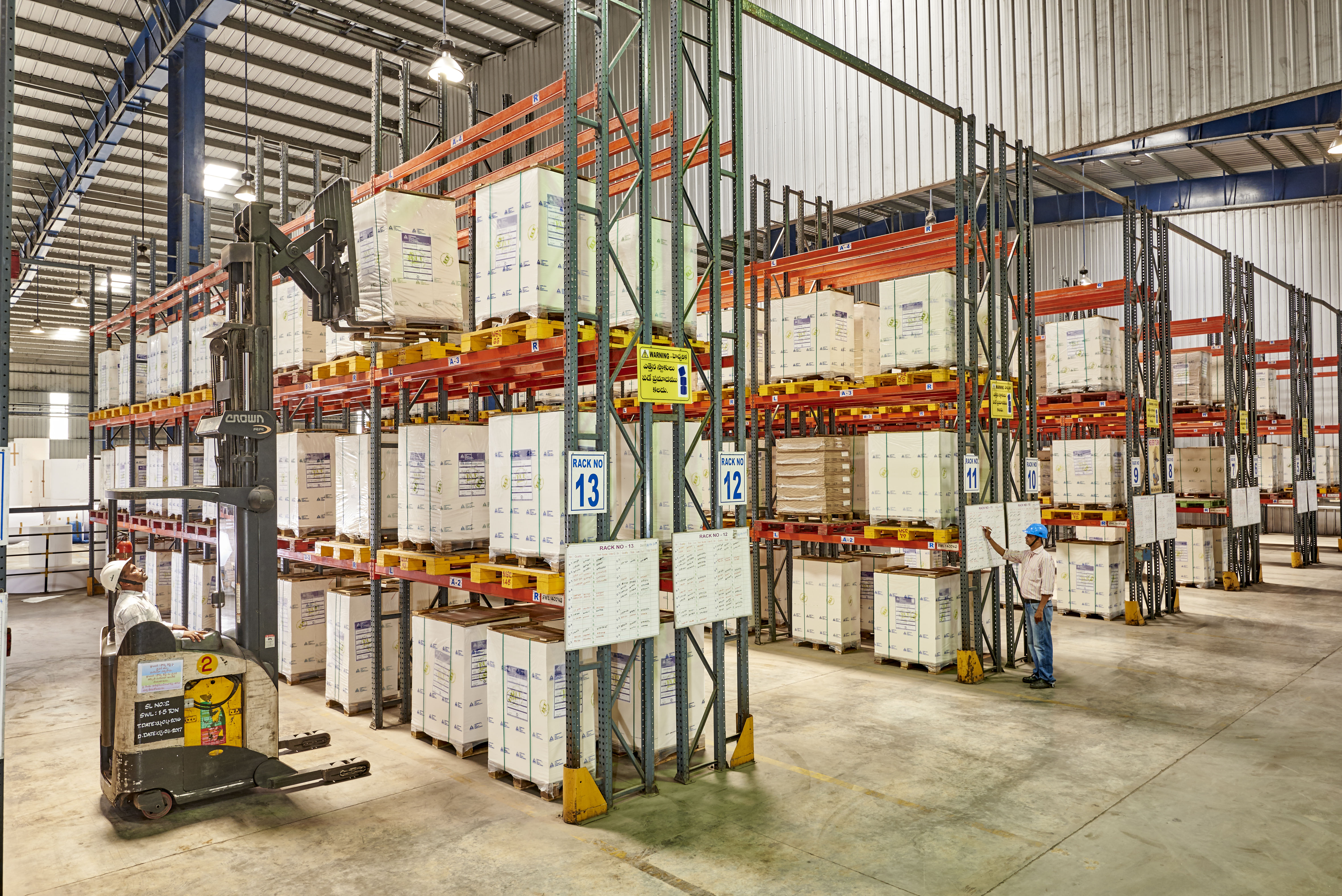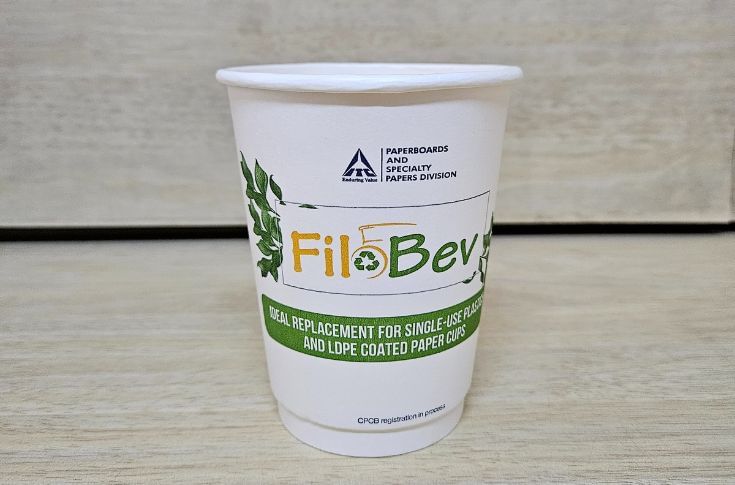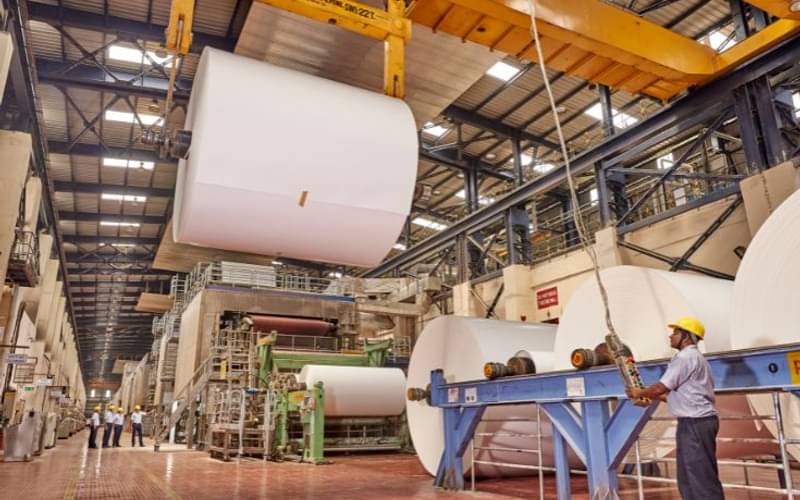Prabhakar Venneti outlines ITC PSPD's plan for 2024
WhatPackaging? magazine catches up with ITC's Prabhakar Venneti on the sidelines of Print Summit 24 at the Tata Theatre in NCPA, on 18 January
14 Feb 2024 | By Ramu Ramanathan
First things first. ITC has quite a few aces up its green sleeves. As Prabhakar Venneti, EVP - sales, marketing and commercial, ITC-PSPD, told the Print Summit 24 audience that ITC ’s paperboards, paper and packaging business is today one of India’s largest, greenest and technologically advanced. And in keeping with India’s ambitious growth trajectory, it is also the first-to-market with extensive product range for single-use plastic substitution; also the first paper company in India to obtain the FSCFM Certification Unit Kovai; the second facility in the world and the first in India to be awarded the AWS Certification; and Unit Bhadrachalam & Kovai are CII GreenCo Platinum Plus certified.
Venneti shares with WhatPackaging? magazine that "We have undertaken and implemented multiple new projects in recent times." This includes a new décor paper machine at Unit Tribeni, state-of-the-art coating and fusion board machines at Unit Bollaram, plus a pulp mill enhancement at Unit Bhadrachalam." He told us, "We have made several significant investments in green technologies, the latest one being a high efficiency recovery boiler at Unit Bhadrachalam. ITC is committed to investments in the areas of energy conservation, increasing the share of renewable energy in our manufacturing and acquiring capabilities for sustainable product offerings."
According to the IPMA, paper consumption in India will reach 30-million tonnes by March 2027. Venneti agrees with these numbers. He says, "I think the numbers are well-projected given strong economic fundamentals of the Indian economy and the export thrust of many of the nation’s manufacturing sectors driven by the world’s China Plus One supply-chain strategy. This will bring new business to Indian companies, fuelling demand for sophisticated and high-end packaging."
Venneti says, "We are seeing phenomenal investments and innovation in the food service and QSR space, with emphasis on food safe packaging for the discerning Indian consumer. India is one of the few countries where writing and printing papers are still growing due to demographics, assured school enrolments, increasing office-goer population for the next decade coupled with state spend on education sector and new education policy, which will only add to the paper demand further."

ITC is working closely with the product development and sourcing teams of various FMCG companies including ITC
ITC's performance
On the one hand, most paper companies have improved their balance sheet. On the other hand, a recent report says, revenue of paper makers will crumple 8-10% this fiscal. How has ITC performed in these volatile times?
ITC's investments in this sector are driven by long-term vision, born out of the company’s commitment to sustainability,creating value for agri/farm produce and supplying high-quality and sustainable printing and packaging substrates to customers. The industry being capital intensive with long gestation, is cyclical in nature. While we have created brands and we cater to end use segments with steady demand, it is difficult to completely avoid overall industry patterns. We are very positive on our performance over the medium to long term.
Venneti sees a growing demand for paper and paperboard?
He says, "We see great opportunities in segments of food services/food packaging, pharma, consumer electronics, apparels, education and publishing and FMCG."
Brands unfold new ideas
We asked Venneti what message the paper industry is conveying to sectors like FMCG and retail about innovative packaging solutions so that the brand managers and product custodians can reduce dependency on plastics.
Prabhakar Venneti says, "AT ITC, we are working very closely with the product development and sourcing teams of various FMCG companies including ITC FMCG businesses. We have already made progress, partnering with them on their plastic substitution agenda. We have solutions which are innovative and forward looking, ably supported by a dedicated team to support these initiatives."
Venneti urges packaging teams at FMCG companies to "Join ITC in co-creating new age plastic replacement solutions." A paper-based replacement for a plastic laminate has to be jointly designed, developed and deployed along with the paper manufacturer, printer-converter and the form-fill-seal machinery manufacturer. The entire ecosystem has to appreciate that paper behaves differently and packaging to be designed accordingly. Seeking to simply replicate plastic properties in paper is probably not the right approach.
Paper industry in India has enabled green cover through plantations with zero deforestation
Venneti shared some tangible examples with OGR / liquid barrier replacing single-use plastic disposables in the F&B segment, such as cups, plates, trays, tubs & bowls as well as anti-fungal boards for the personal care segment. Also, he shared an example of flexible paper which can replace flexible plastic in packaging applications. This flexible paper has good barrier properties. Similarly he shared the example of a rigid board that can replace rigid plastic and foam boards for POP/POSM that are deployed for indoor branding. Finally, he shared moulded fibre packaging examples which are ideal for complex shapes in the packaging or disposables segment and possess OGR properties for the F&B segment.
Sustainable packaging alternatives
The two headline acts of 2023 have been plastic substitution which was expected to transpire due to the single-use plastic ban. Also the additional demand of 2-3 lakh TPA. Has it been achieved, we ask Venneti?
He says, "This is the focus area, both for our business and the industry. We see great opportunity to contribute to the country’s targets on plastic substitution and a cleaner environment for our next generation. While adoption has been slow, we can confidently mention that almost all our customers are having clear targets and this forms the most serious agenda with most companies/end users we work with."
Venneti says, "We have been able to leverage our R&D capabilities to launch several paper-based alternatives to single-use plastic." ITC's Filo series of sustainable paperboards has gained significant traction in the packaging industry, both in India and abroad. Under the Filo series, ITC has FiloBev, FiloPack, FiloServe and FiloTub, which are replacements to single-use plastic and LDPE-coated packaging/disposables in the F&B industry.
Venneti says, "We have plans to expand this portfolio by deepening product development to target newer applications, including the personal care segment as well."
Apart from Filo, ITC has recently launched Sign-Up Green which is a virgin solid board that can replace rigid plastics/plastic foam boards in the indoor branding space (POP/POSM materials).
Paper adoption offers more
Everyone talks about the boom in e-commerce shopping as well as ready-to-eat and packaged foods. What is the impact on the paper sector due to this boom?
Venneti says, "Both these sectors have made significant progress in adopting paper, wherever plastic could have been replaced. As mentioned above, these form our priority and many of our initiatives are aimed at providing innovative solutions to these end uses. In my opinion, eCommerce is inclined towards kraft / corrugated boxes while the ready-to-eat and packaged foods category has moved to high-end virgin paperboards that can accurately replicate the print demand of the brand. A picture of a biryani or a soup printed on the carton must actually look like the real dish.
In eCommerce, customers are demanding the same in-store experience of the brand and there are many ‘unboxing’ experience stories on social media, further strengthening the demand for high-end packaging.

According to IPMA, paper consumption in India will reach 30-million tonnes by March 2027
Paper gains with packaging
Many Indian paper companies have entered the next phase of expansion due to high-capacity utilisation and strong balance sheet position. Venneti concurs, He says, "Yes, various mills have announced investments which are aimed at venturing into newer segments and to provide superior quality papers and paperboards to Indian consumers. The industry is in a strong growth phase."
A leading paper expert told us, "There are challenges on the raw material side. The paper industry expects much-more volatility and this could impact manufacturing costs of paper mills." The largest input raw material for virgin wood-based paper and paperboard mills is fibre which is sourced from the local wood and imported fibre." On the one hand, there is the dynamics of imported fibre plus there is the domestic wood scenario which is stressed. All paper mills which depend on wood-based fibre are likely to face major supply and cost challenges.
The message that is being heard on most paper forums is: "Indian paper mills will need to innovate their own solutions."
Globally paper remains the most environmentally friendly packaging medium. Paper industry in India has enabled green cover through plantations with zero deforestation. We must collectively work to further increase awareness and contribute to higher recycling of paper-based products to achieve higher recycling rates so that the country does not import waste paper. I would like every customer to realise that when they use paper, they are actually holding a ‘Carbon-Sink’ in their hand while contributing to many farmer livelihoods.
Wish list for the Finance Minister
Prabhakar Venneti says, "Unlike in many parts of the world, the paper industry in India is not forest-based but is based on agro/farm forestry with strong roots and linkages with the farming community, generating rural employment and impacting the village economies positively. The industry has played a pioneering role in generating and augmenting green cover, carbon sequestration and restoration of degraded land."
Venneti says, "Our wish is to encourage Make in India in the paper manufacturing sector and provide a level-playing field to Indian manufacturers."
Presently, there is a 43% increase in imports of paper and paperboard in H1 of FY24 on the back of a 25% increase in FY23 in volume terms. Pawan Agarwal, who is the president of Indian Paper Manufacturers Association says, "Imports of paper and paperboard are growing at a rate higher than the growth in domestic production leading to underutilisation of installed capacity."
The Indian paper industry has asked for suitably increasing import duty on paper in the Union Budget 2024 to provide a level playing field for domestic manufacturers.



